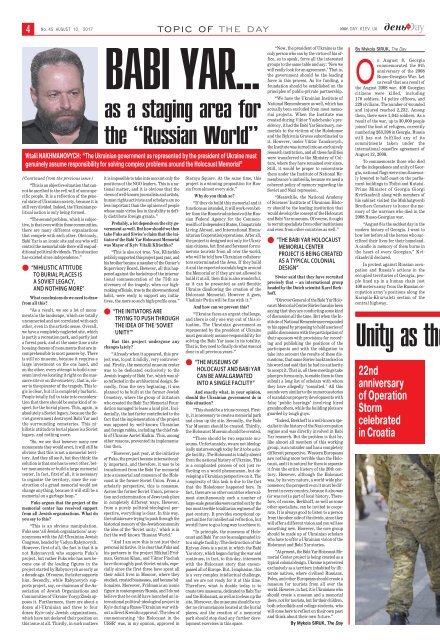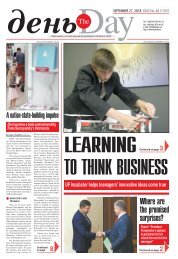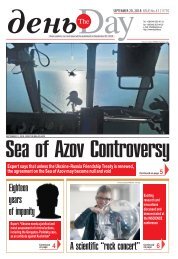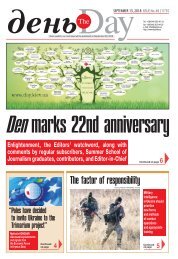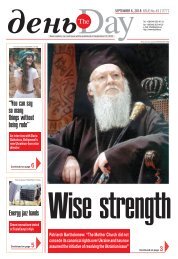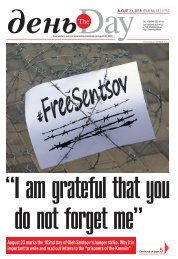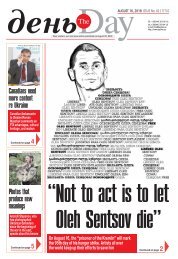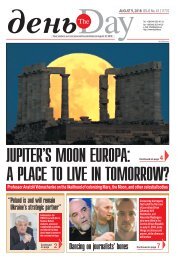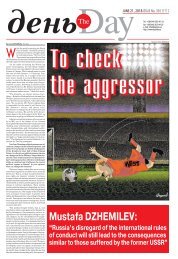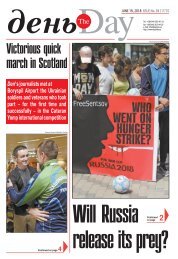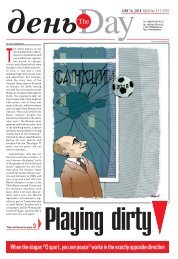Create successful ePaper yourself
Turn your PDF publications into a flip-book with our unique Google optimized e-Paper software.
4<br />
No.45 AUGUST 10, 2017<br />
(Continued from the previous issue)<br />
“This is an objective situation that cannot<br />
be ascribed to the evil will of some specific<br />
people. It is a reflection of the general<br />
state of Ukrainian society, because it is<br />
still very divided. Indeed, the Ukrainian political<br />
nation is only being formed.<br />
“The second problem, which is subjective,<br />
is that even within these communities,<br />
there are many different organizations<br />
that compete with each other. Obviously,<br />
Babi Yar is an iconic site and one who will<br />
control the memorial side there will reap additional<br />
political dividends. This situation<br />
has existed since independence.”<br />
● “NIHILISTIC ATTITUDE<br />
TO BURIAL PLACES IS<br />
A SOVIET LEGACY,<br />
AND NOTHING MORE”<br />
What conclusions do we need to draw<br />
from all this?<br />
“As a result, we see a lot of monuments<br />
in the landscape, which are totally<br />
unconnected and not correlated with each<br />
other, even in the artistic sense. Overall,<br />
we have a completely neglected site, which<br />
is partly a recreation park, and partly just<br />
a forest park, and at the same time a site<br />
housing dozens of monuments that are incomprehensible<br />
to most passers-by. There<br />
is still no museum, because it requires a<br />
large investment on the one hand, and<br />
on the other, every attempt to build a museum<br />
involves locating it right on the massacre<br />
site or on the cemetery, that is, closer<br />
to the epicenter of the tragedy. This logic<br />
is clear, but it is completely barbaric.<br />
People totally fail to take into consideration<br />
that there should be some kind of respect<br />
for the burial places. This, again, is<br />
absolutely a Soviet legacy, because the Soviet<br />
government destroyed Babi Yar and<br />
the surrounding cemeteries. This nihilistic<br />
attitude to burial places is a Soviet<br />
legacy, and nothing more.<br />
“So, we see that however many new<br />
monuments they would erect, it will still be<br />
obvious that this is not a memorial territory.<br />
And they all see it, but they think: the<br />
solution is that one has to erect other, better<br />
monuments or build a large memorial<br />
center. In fact, first of all, it is necessary<br />
to organize the territory, since the construction<br />
of a grand memorial would not<br />
change anything, because it will still be a<br />
memorial on a garbage heap.”<br />
Fuks argues that the project of the<br />
memorial center has received support<br />
from all Jewish organizations. What do<br />
you say to this?<br />
“This is an obvious manipulation.<br />
Fuks sees ‘all Jewish organizations’ as synonymous<br />
with the All-Ukrainian Jewish<br />
Congress, headed by Vadym Rabynovych.<br />
However, first of all, the fact is that it is<br />
not Rabynovych who supports Fuks’s<br />
project, but rather Fuks who has now become<br />
one of the leading figures in the<br />
project started by Rabynovych as early as<br />
a decade ago. Of course, the latter supports<br />
him. Secondly, while Rabynovych supports<br />
project, say, co-chairman of the Association<br />
of Jewish Organizations and<br />
Communities of Ukraine Yosyp Zisels opposes<br />
it. Furthermore, there are about a<br />
dozen all-Ukrainian and three to four<br />
dozen Kyiv-only Jewish organizations,<br />
which have not declared their position on<br />
this issue at all. Thirdly, in such matters<br />
it is impossible to take into account only the<br />
positions of the NGO leaders. This is a national<br />
matter, and it is obvious that the<br />
views of well-known journalists and artists,<br />
human rights activists and scholars are no<br />
less important than the opinions of people<br />
whose main virtue lies in the ability to deftly<br />
distribute foreign grants.”<br />
Probably, a lot depends on the city government<br />
as well. But how should we then<br />
take Fuks and Siwiec’s claim that the initiator<br />
of the Babi Yar Holocaust Memorial<br />
was Mayor of Kyiv Vitalii Klitschko?<br />
“This is also not true. Yes, Klitschko<br />
publiclysupportedthisprojectpastyear,and<br />
his brother became a member of the Center’s<br />
Supervisory Board. However, all this happened<br />
against the backdrop of the international<br />
commemoration of the 75th anniversary<br />
of the tragedy, when our highrankingofficials,truetotheabovementioned<br />
habit, were ready to support any initiatives,<br />
the more so such high-profile ones.”<br />
● “THE INITIATORS ARE<br />
TRYING TO PUSH THROUGH<br />
THE IDEA OF THE ‘SOVIET<br />
UNITY’”<br />
Has this project undergone any<br />
changes lately?<br />
“Already when it appeared, this project<br />
was, to put it mildly, very controversial.<br />
Firstly, the memorial museum center<br />
was to be dedicated exclusively to the<br />
Jewish tragedy of Babi Yar, which was also<br />
reflected in the architectural design. Secondly,<br />
from the very beginning, it was<br />
planned to be built at the former Jewish<br />
Cemetery, where the group of initiators<br />
who created the Babi Yar Memorial Foundation<br />
managed to lease a land plot. Incidentally,<br />
the last factor contributed to the<br />
fact that the implementation of the project<br />
was opposed by well-known Ukrainian<br />
and foreign rabbis, including the chief rabbi<br />
of Ukraine Azriel Haikin. This, among<br />
other reasons, prevented its implementation<br />
then.<br />
“However, past year, at the initiative<br />
of Fuks, the project became internationally<br />
important, and therefore, it was to be<br />
transformed from the Babi Yar memorial<br />
into a memorial and museum of the Holocaust<br />
in the former Soviet Union. From a<br />
scholarly perspective, this is nonsense.<br />
Across the former Soviet Union, persecution<br />
and extermination of Jews took place<br />
in completely different ways. However,<br />
from a purely political-ideological perspective,<br />
everything is clear. In this way,<br />
the initiators are trying to push through the<br />
historical memory of the Jewish community<br />
the idea of the ‘Soviet unity,’ which is in<br />
fact the well-known ‘Russian World.’<br />
“And I am sure this is not just their<br />
personal initiative. It is clear that Fuks and<br />
his partners in the project Mikhail Fridman,<br />
German Khan, and Viktor Pinchuk<br />
have thoroughly post-Soviet minds, especially<br />
since the first three have spent all<br />
their adult lives in Moscow, where they<br />
studied, created businesses, and became billionaires.<br />
Moreover, Fridman is an iconic<br />
figure in contemporary Russia, and I do not<br />
believe that he could have launched an international<br />
political-ideological project in<br />
Kyiv during a Russo-Ukrainian war without<br />
a direct Kremlin approval. The idea of<br />
commemorating ‘the Holocaust in the<br />
USSR’ was, in my opinion, approved in<br />
TOPIC OF THE DAY<br />
BABIYAR...<br />
as a staging area for<br />
the “Russian World”<br />
Vitalii NAKHMANOVYCH: “The Ukrainian government as represented by the president of Ukraine must<br />
genuinely assume responsibility for solving complex problems around the Holocaust Memorial”<br />
Staraya Square. At the same time, this<br />
project is a winning proposition for Russia<br />
from almost every side.”<br />
Why do you think so?<br />
“If they do build this memorial and it<br />
functions as intended, it will work even better<br />
than the Rossotrudnichestvo (the Russian<br />
Federal Agency for the Commonwealth<br />
of Independent States, Compatriots<br />
Living Abroad, and International Humanitarian<br />
Cooperation) operations. After all,<br />
the project is designed not only for Ukrainian<br />
citizens, but first and foremost for numerous<br />
tourists from all over the world,<br />
who will be told how Ukrainian collaborators<br />
exterminated the Jews. If they build<br />
it and the expected scandals begin around<br />
the Memorial or if they are not allowed to<br />
build it at all, then this is also wonderful,<br />
as it can be presented as anti-Semitic<br />
Ukraine disallowing the creation of the<br />
Holocaust Memorial. However it goes,<br />
Vladimir Putin will be fine with it.”<br />
And how can we prevent this?<br />
“Ukraine faces an urgent challenge,<br />
and there is only one way out of this situation.<br />
The Ukrainian government as<br />
represented by the president of Ukraine<br />
must genuinely assume responsibility for<br />
solving the Babi Yar issue in its totality.<br />
That is, they need to finally do what was not<br />
done in all previous years.”<br />
● “THE MUSEUMS OF<br />
HOLOCAUST AND BABI YAR<br />
CAN BE AMALGAMATED<br />
INTO A SINGLE FACILITY”<br />
And exactly what, in your opinion,<br />
should the Ukrainian government do in<br />
this situation?<br />
“This should be a triune concept. Firstly,<br />
it is necessary to create a memorial park<br />
and clean up the site. Secondly, the Babi<br />
Yar Museum should be created. Thirdly,<br />
the Holocaust Museum should be created.<br />
“These should be two separate museums.<br />
Unfortunately, we are not ideologically<br />
mature enough today for it to be a single<br />
facility. The Holocaust is totally absent<br />
from the national history of Ukraine. This<br />
is a complicated process of not just reflecting<br />
on a world phenomenon, but developing<br />
a Ukrainian perspective on it. The<br />
complexity of this task is due to the fact<br />
that the Holodomor happened here. In<br />
fact, there are no other countries where almost<br />
simultaneously such a number of<br />
large-scale genocides were carried out by the<br />
two most terrible totalitarian regimes of the<br />
past century. It provides exceptional opportunities<br />
for intellectual reflection, but<br />
we still have to go a long way to achieve it.<br />
“In principle, the museums of Holocaust<br />
and Babi Yar can be amalgamated into<br />
a single facility. The destruction of the<br />
Kyivan Jews is a point in which the Babi<br />
Yar story, which began during the war and<br />
continues, in fact, to this day, intersects<br />
with the Holocaust story that encompassed<br />
all of Europe. But, I emphasize, this<br />
is a very complex intellectual challenge,<br />
and we are not ready for it at this time.<br />
Therefore, what is doable today is to<br />
create two museums, dedicated to Babi Yar<br />
and the Holocaust, as well as to clean up the<br />
site. Moreover, the museums should be under<br />
no circumstances located at the burial<br />
places, and the creation of a memorial<br />
park should stop dead any further development<br />
exercises in this space.<br />
“Now, the president of Ukraine is the<br />
only person who can by the virtue of his office,<br />
so to speak, force all the interested<br />
groups to the same table and say: ‘Now we<br />
will really look for an agreement.’ That is,<br />
the government should be the leading<br />
force in this process. As for funding, a<br />
foundation should be established on the<br />
principles of public-private partnership.<br />
“We have the Ukrainian Institute of<br />
National Remembrance as well, which has<br />
actually been excluded from most memorial<br />
projects. When the Institute was<br />
created during Viktor Yushchenko’s presidency,<br />
it had the Babi Yar Sanctuary, memorials<br />
to the victims of the Holodomor<br />
and the Bykivnia Graves subordinated to<br />
it. However, under Viktor Yanukovych,<br />
the Institute was turned into an exclusively<br />
research institution, and all these facilities<br />
were transferred to the Ministry of Culture,<br />
where they have remained ever since.<br />
Still, it would be proper to concentrate<br />
them under the Institute of National Remembrance’s<br />
umbrella, because we need a<br />
coherent policy of memory regarding the<br />
Soviet and Nazi repression.<br />
“Meanwhile, the National Academy<br />
of Sciences’ Institute of Ukrainian History<br />
should be the leading institution that<br />
would develop the concept of the Holocaust<br />
and Babi Yar museums. Of course, it ought<br />
to recruit specialists from other institutions<br />
and even from other countries as well.”<br />
● “THE BABI YAR HOLOCAUST<br />
MEMORIAL CENTER<br />
PROJECT IS BEING CREATED<br />
AS A TYPICAL COLONIAL<br />
DESIGN”<br />
Siwiec said that they have recruited<br />
precisely that – an international group<br />
headed by the Dutch scientist Karel Berkhoff.<br />
“Director General of the Babi Yar Holocaust<br />
Memorial Center Siwiec has also been<br />
saying that they are conducting some kind<br />
of discussion all the time. But when the Institute<br />
of National Remembrance responded<br />
to his appeal by proposing to hold a series of<br />
public discussions with the participation of<br />
their sponsors with provisions for recording<br />
and publishing the positions of the<br />
participants and with the obligation to<br />
take into account the results of these discussions,<br />
that same Siwiec backtracked on<br />
his word and said that he had no authority<br />
to accept it. That is, all these meetings take<br />
place pro forma only, to enable them to then<br />
submit a long list of scholars with whom<br />
they have allegedly ‘consulted.’ All this<br />
sounds very similar to the numerous stories<br />
of scandalous property developments with<br />
false ‘public hearings’ involving hired<br />
grandmothers, while the building plots are<br />
guarded by tough guys.<br />
“Indeed, Berkhoff is a well-known specialist<br />
in the history of the Nazi occupation<br />
regime and was directly involved in Babi<br />
Yar research. But the problem is that he,<br />
like almost all members of this working<br />
group, is an outsider and has a completely<br />
different perspective. Western Europeans<br />
saw nothing more terrible than the Holocaust,<br />
and it is natural for them to separate<br />
it from the entire history of the 20th century.<br />
However, although the Holocaust<br />
was, by its very nature, a world-wide phenomenon;<br />
the perspective on it must be different<br />
in every country, because it also was<br />
(or was not) a part of local history. Therefore,<br />
of course, Berkhoff, as well as some<br />
other specialists, can be invited to cooperate.<br />
It is always good to listen to a person<br />
from the other side of the divide, since they<br />
will offer a different vision and you will see<br />
something new. However, the core group<br />
should be made up of Ukrainian scholars<br />
who have to offer a Ukrainian vision of the<br />
Holocaust and Babi Yar stories.<br />
“Atpresent,theBabiYarHolocaustMemorial<br />
Center project is being created as a<br />
typical colonial design. Ukraine is perceived<br />
exclusively as a territory inhabited by illiterate<br />
natives, where civilized Russians,<br />
Poles, and other Europeans should create a<br />
museum for tourists from all over the<br />
world.However,infact,itisUkrainianswho<br />
should create a museum and a memorial<br />
there,notfortourists, butfortheirchildren,<br />
both schoolkids and college students, who<br />
will come here to reflect on their own past<br />
and think about their own future.”<br />
By Mykola SIRUK, The Day<br />
WWW.DAY.KIEV.UA<br />
By Mykola SIRUK, The Day<br />
On August 8, Georgia<br />
commemorated the 9th<br />
anniversary of the 2008<br />
Russo-Georgian War. Let<br />
us recall that as a result of<br />
the August 2008 war, 408 Georgian<br />
citizens were killed, including<br />
170 soldiers, 14 police officers, and<br />
228 civilians. The number of wounded<br />
and injured reached 2,232. Among<br />
them, there were 1,045 soldiers. As a<br />
result of the war, up to 30,000 people<br />
joined the host of refugees, currently<br />
numbering 263,598 in Georgia. Russia<br />
still has not fulfilled any of its<br />
commitments taken under the<br />
international ceasefire agreement of<br />
August 12, 2008.<br />
To commemorate those who died<br />
for the independence and unity of Georgia,<br />
national flags were simultaneously<br />
lowered to half-mast on the parliament<br />
buildings in Tbilisi and Kutaisi.<br />
Prime Minister of Georgia Giorgi<br />
Kvirikashvili along with members of<br />
his cabinet visited the Mukhatgverdi<br />
Brothers Cemetery to honor the memory<br />
of the warriors who died in the<br />
2008 Russo-Georgian war.<br />
“August 8 is the saddest day in the<br />
modern history of Georgia. I want to<br />
bow low before all the heroes who sacrificed<br />
their lives for their homeland.<br />
A candle in memory of them burns in<br />
the heart of every Georgian,” Kvirikashvili<br />
declared.<br />
In protest against Russian occupation<br />
and Russia’s actions in the<br />
occupied territories of Georgia, people<br />
lined up in a human chain just<br />
400 meters away from the Russian occupation<br />
army’s positions along the<br />
Karapila-Khurvaleti section of the<br />
central highway.<br />
Unity as the<br />
22nd<br />
anniversary<br />
of Operation<br />
Storm<br />
celebrated<br />
in Croatia


